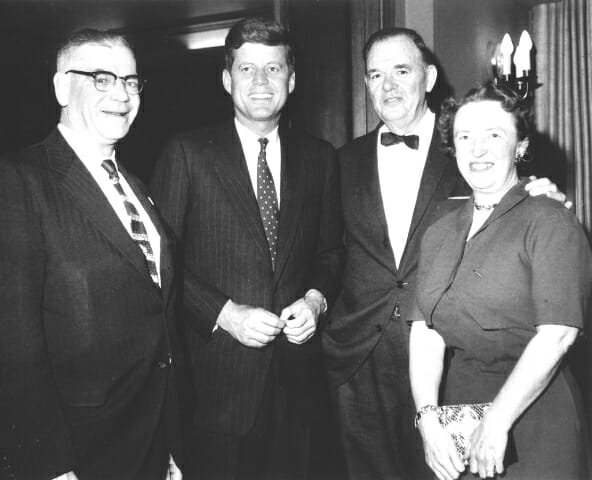Gastineau Channel Memories
Wade/Case
Martin J. McKeown
My parents are James R. and Suzanne (Wade) McKeown. My father passed away in 1976, and my mother lives here in Juneau. I was born on May 5, 1968, and am married to a wonderful lady, Marjorie McKeown. We have four children, Madelynne and Katie McKeown, ages 3 and 5 and Quincy and Mackenzie Judson, ages 12 and 15. I am the sales manager at Evergreen Motors. The short history of my great grandfather, William H. Case, is from information received from my mother, his granddaughter.
William H. Case first came to Alaska in the early to mid-1890?s. He was a great photographer and an avid outdoorsman. He returned to Alaska at the time of the gold rush and settled in Skagway as a photographer. His sweetheart, Alice Lindahl, followed him to Skagway from the Seattle area. They were wed in 1898, and had three children, Madge, Howard and Alice. ?They were the first Caucasian couple married in the City of Skagway.? This is a direct quote from my grandmother. The family moved to Juneau in the early 1900?s. He pursued his photography business and owned a curio shop. Many of the photographs of old Juneau and outlying southeast communities are his work. A collection of his work is housed at the Alaska State Museum. He continued to hunt extensively and hiked the many mountains in southeast. He and a group of friends were responsible for the original cross on top of Mt. Roberts. William died in 1919, and his widow took the children to the Seattle area. All of the children, however, returned to the Juneau area to settle and marry. Madge married Hugh J. Wade and they had three children, Hugh Gerald, Suzanne, and Michael Howard. Howard married a school teacher, Margaret McFaden, and they had one son, Bill. Alice married Lokke (Don) MacKinnon and they had two children, Donald and Lorna Dee. Several great and great great grandchildren live in Juneau to this day.
Hugh Joseph Wade was born to John and Mary (Dougherty) Wade in Dougherty, Iowa, on June 29, 1901. He was the eighth of nine children. In 1920, he enrolled at Drake University and was named to the all Missouri Valley conference football team as an end. Later, he transferred to the University of Iowa, where he was the starting end on the undefeated Big Ten championship team in 1922. Iowa capped that season with a 6-0 win over Yale, which Hugh relished as ?the victory of corn over culture.?
The following year, Hugh received a law degree from the University of Iowa. After practicing law briefly in Omaha, Nebraska, he joined the FBI. As a member of the first group of agents recruited and trained by J. Edgar Hoover, he came to Alaska in 1926. Hugh viewed himself as a lucky Irish-Catholic Democrat who arrived in the Territory under false pretenses and married into a pioneer Alaska family. Wade was undercover with the FBI, posing as a bond salesman, when he met his future wife, Madge Case. After a lengthy, long distance courtship, the couple married in 1933, in Washington, D.C.
Soon after, Hugh was recruited to establish President Franklin D. Roosevelt?s National Recovery Administration program in Alaska, and the couple returned to Juneau. The New Deal initiative was later aborted and he became director of the Social Security Administration in Alaska in 1935 until 1950. That year he was appointed area director of the Alaska Native Service where he was instrumental in the reorganization and renovation of the Mount Edgecumbe School in Sitka, and the design and construction of the Alaska Native Sisterhood hospital in Anchorage.
In 1955, he was elected Territorial Treasurer, a post he held for two terms. After passage of the Alaska Statehood Act in 1958, Wade was elected as Secretary of State, serving until 1966 with Democratic Governor Bill Egan.
Immediately after the team was inaugurated in January 1959, Governor Egan became ill and was
hospitalized. Wade served as acting governor during the first session of the Alaska State Legislature and until Egan recovered and returned to Alaska that May. Egan and Wade lost to Walter J. Hickel and Keith Miller in the 1966 election. That December, Hugh was appointed regional solicitor for the federal Department of the Interior. Later, Hickel, then Secretary of the Interior, invited him to Washington to serve as special counsel on Alaska Native claims settlement legislation.
After passage of the Alaska Native Claims Settlement Act in 1971, Hugh and Madge retired and converted their summer cabin at Tee Harbor to a year-round residence.
Madge and Hugh?s son Mike died in 1971, and their daughter-in-law Dorothy lives in Washington. Son Jerry and his wife Sylvia live in Anchorage, as does their son Hugh. Their daughter Megan lives in Illinois and daughter Gretchen in Oregon. Sue and Jim McKeown?s children, Erin, Wade, Sean, Marty and Stacy, all live in Juneau.
Madge died in April, 1977, and Hugh died March 25, 1995.
Burke Riley, Hugh?s friend for more than fifty years remembers Hugh as a ?big, well-liked, highly respected guy,? and Senator Bill Ray noted that Hugh ?was one of the old statesmen...? His family remembers him as ?an old fashioned man, fiercely devoted to God, his community and his family, but not much into talking about those things.?
Hugh Wade loved Alaska and traveled the length and breadth of the state. He was a big, quiet man with a farmer?s passion for the land, and a fisherman?s delight in Southeastern Alaska?s inland waterways. He enjoyed gardening, fishing and hunting; and smoking and processing his own fish and game.
 |
Bob Bartlett, JFK, Hugh Wade and Madge Wade. |
